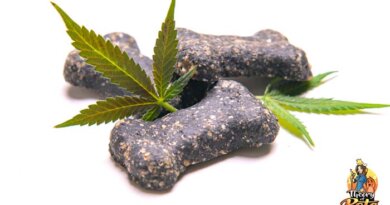Home Remedies, Best Food Options & More
To keep the lights on, we receive affiliate commissions via some of our links. Our review process.

If your pup has come down with the “runs,” you’re in the right place to help resolve this messy condition. Unfortunately, diarrhea is a common occurrence in dogs, with many different causes and levels of severity. The good news is that most cases of diarrhea in dogs can be cleared up fairly quickly with home treatment.
But what can you give a dog with diarrhea? See our suggestions for home remedies, including pumpkin, probiotics, and over-the-counter remedies. We also give you feeding guidelines and other tips to help you get through this sticky situation. However, see our recommendations about when it’s time to skip home treatment and contact your vet.
What Causes Diarrhea In Dogs?
Stomach issues, including diarrhea, are some of the most common reasons for vet visits. Unfortunately, most dogs experience occasional diarrhea for several reasons. Others may have frequent bouts or chronic diarrhea with more serious health issues.
Less Serious Causes
- Eating garbage or spoiled food
- Switching to a new food too quickly
- Medication use, such as antibiotics
- A stressful or anxiety-inducing event, like a vet visit or kennel boarding
More Serious Causes
- Ingesting something toxic (learn which foods and plants are toxic to dogs)
- Ingestion of foreign objects
- Parasites, such as hookworms, roundworms, or Giardia
- Viral infections, such as parvovirus or distemper
- Bacterial infections
- Food allergies*
- Pancreatitis
- Colitis or inflammatory bowel disease
- Liver, kidney, or heart disease
- Intestinal cancer
*If you suspect that your dog’s diarrhea could be due to a food intolerance or allergy, you may want to consider an at-home dog allergy test to discover the source. All you have to do is send a saliva or hair sample to the company’s lab and get results within a few weeks. You can then share these results with your vet to help further narrow down possible causes.
When Should I Contact My Vet?
With so many possible causes and underlying health issues, how do you know whether your dog needs to see the vet for diarrhea? “Diarrhea in dogs is a problem that we see very often in our practice,” says Dr. Rebecca MacMillan, BVetMed, BSAVA, PGCertSAM, MRCVS, a companion animal veterinarian in Gloucester, United Kingdom. “This is why the exact treatment I recommend depends on how sick a dog is.”
According to Dr. MacMillan, signs that your dog needs urgent veterinary attention include:
- Passing large amounts of watery diarrhea
- Bloody diarrhea
- Vomiting
- Abdominal pain
- Lack of appetite
- Lethargy
- Weight loss
If your pup is exhibiting any concerning symptoms or his diarrhea lasts more than two days, contact your veterinary clinic. They’ll let you know whether you should bring your dog in for an examination. Your vet may need to perform some tests such as fecal samples, blood tests, and diagnostic imaging (e.g., ultrasounds and X-rays). But in other cases, they might suggest symptomatic treatment, especially if your dog is otherwise well.
Did You Know?
Should I Feed My Dog With Diarrhea?
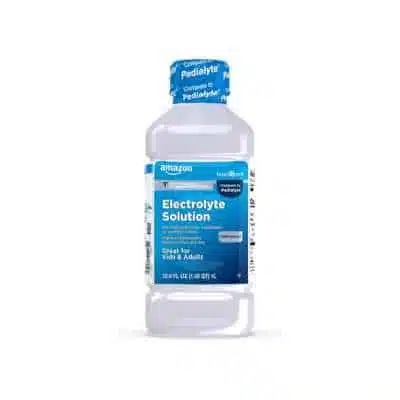
Many veterinarians recommend fasting for dogs with diarrhea. Withholding food for 12 to 24 hours allows your furry friend’s digestive tract to resolve itself from whatever’s causing the diarrhea. However, it’s crucial to give your dog plenty of water because diarrhea can cause dehydration and electrolyte imbalances. You can also offer your pup an unflavored electrolyte solution as long as your vet gives you the green light.
Keep in mind, though, that fasting isn’t healthy for all dogs. Some need regular feeding to avoid problems like a drop in blood sugar levels. Fasting is usually off-limits for:
- Puppies under 3 months old
- Senior dogs
- Toy and small breeds, like Chihuahuas and Shih Tzus
- Dogs with health issues
When in doubt, it’s a good idea to consult your vet about whether fasting is appropriate for your dog.
What Can You Give A Dog For Diarrhea?
In many cases of mild diarrhea, you can help soothe your dog’s tummy troubles at home. Some home remedies that may do the trick include:
Pumpkin
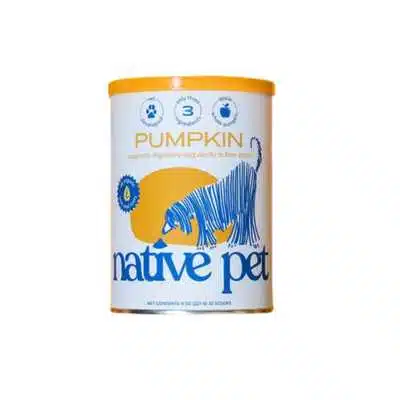
A dietary pumpkin supplement, like Native Pet’s organic pumpkin powder, or canned pumpkin may help ease your pup’s symptoms and get things back on track. Pumpkin is high in fiber, which helps regulate the digestive system. For small to medium dogs, feed 1-3 teaspoons, and for large dogs, offer 1-3 tablespoons. And make sure you use canned pumpkin with no additives or seasonings, which will do more harm than good.
Dog Probiotics
Many owners of dogs who are prone to antibiotic-induced diarrhea (among other types of diarrhea) find that dog-specific probiotics are very helpful. Antibiotic use, ingestion of spoiled food, and many other factors can throw a dog’s gut out of whack, resulting in diarrhea. Probiotics introduce billions of beneficial living bacteria into your dog’s gut to restore his tummy health.
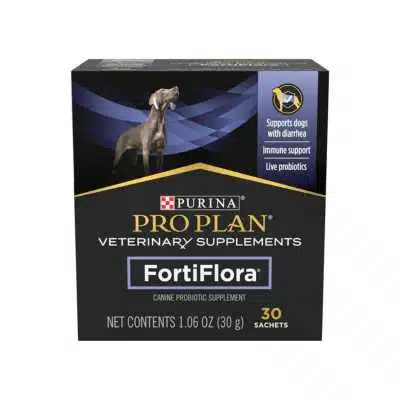
For diarrhea, we recommend Purina Fortiflora, which gets amazing reviews from pup owners. Probiotics have many other health benefits for dogs, including boosting immune health, easing allergies and skin inflammation, relieving anxiety, and more. See our reviews of the best probiotics for dogs to learn more.
Over-The-Counter Canine Diarrhea Medication
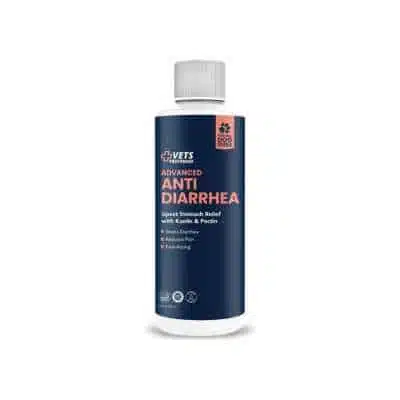
If you’ve tried natural solutions and aren’t having any luck, you may want to speak to your vet about using an over-the-counter medication formulated specifically for dogs. Many pup owners find Vets Preferred Anti Diarrhea quite effective for diarrhea (and gas relief). Fast-acting active ingredients include kaolin, a type of clay found in nature, and pectin, a soluble fiber (polysaccharide) derived from fruits. They work by binding substances in the intestine, which helps produce firm stool.
Pepto-Bismol and Imodium
While Pepto-Bismol (bismuth subsalicylate) or Imodium (loperamide) may be okay for your canine companion, experts advise pup owners to always check with your vet first to see if these human medications are safe and to get appropriate dosing. Pepto-Bismol and Imodium can be harmful to certain dogs, may interact with other medications, and can be toxic if too much is given.
What To Feed A Dog With Diarrhea
After your pup’s fasting period, you can slowly begin feeding him bland, easily digestible food as long as he’s symptom-free. It’s best to start with a very small amount of food to make sure your dog’s tummy can handle it. You’ll also want to feed small portions several times during the day. So, what’s the best food for a dog with diarrhea? Here are some options that veterinarians typically recommend.
- Plain, cooked white rice with plain boiled skinless chicken breast (see our recipe)
- 100% pure canned pumpkin (not pumpkin pie filling) or pumpkin powder (see above)
- Boiled, mashed white or sweet potatoes (remove skin before boiling)
- Boiled, unseasoned eggs
- Plain, low-fat cottage cheese
“For dogs who have a mild upset tummy and diarrhea, I often suggest feeding them bland, easy-to-digest food for a few days such as a gastrointestinal/sensitivity diet or cooked chicken and boiled rice,” says Dr. MacMillan. “Probiotics can be useful in many cases too, helping to replenish ‘good gut bacteria’ which may resolve diarrhea faster. I often also recommend de-worming treatment to try and rule out underlying parasite issues. However, in my experience, dogs that don’t respond to these suggestions usually need additional diagnostics or treatments.”
Our Personal Experience With A Dog With Diarrhea
“Our dog had a bad batch of canned dog food and had bad diarrhea for over a week. We tried giving him a bland food and that helped but there was lingering loose stool for awhile as the icky food got out of his system. We eventually took him to the vet to make sure it wasn’t something else more serious like a parasite. Since Georgie wasn’t showing any other symptoms we didn’t end up doing additional tests, and eventually the diarrhea went away on its own. His primary care vet said to give him a probiotic to help sooth his tummy, but then the emergency vet said that probiotics can actually do more harm than good in the long run, because his body needs to learn how to fight off bacteria on its own.”
– Sadie Cornelius, Cavalier King Charles Spaniel mom
What If My Dog Has Chronic Diarrhea?
If your furry friend has ongoing episodes of diarrhea and your vet has ruled out any serious health issues, you should consider a diet change (with the advice of your vet). Some dogs simply have sensitive stomachs and require special diets to keep their digestive problems at bay.
What’s the best dog diet for chronic diarrhea or other GI issues? In many cases, vets will recommend a prescription diet or suggest a non-prescription dog food formulated for sensitive stomachs. Some owners also find that switching their pup to fresh dog food or a limited-ingredient diet helps resolve chronic tummy problems. And giving your furry friend a daily probiotic is an excellent way to maintain his gut health.
Tagged With: Digestion




